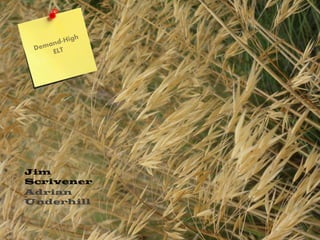
Demand High ELT
- 3. Much contemporary teaching is “good-enough” … but not better
- 4. The Communicative Approach has settled down into a safe, peaceful, dead-end
- 5. Most teaching is demand-low challenge-low “fear of intervention”
- 6. We use our students as our excuse “humanistic” = “being nice to students “ “facilitation” = “being nice to students “
- 7. We no longer know how to work up-close, in-the- moment, with language There is a taint of guilt to doing any demanding hands- on language work
- 8. We teach at a distance from learning, rather than getting up-close
- 9. We have created systems (in schools, ministries, international bodies etc) that encourage, validate, reward and maintain unadventurous, low-awareness teaching and learning
- 10. so …
- 11. It really is ok to “teach”
- 12. Skilful interventions are a crucial teaching tool
- 13. Categories of Key Teacher Interventions Classroom Management Techniques Jim Scrivener
- 15. Creating and exploiting all the opportunities for learning Facilitation is an active, creative, shaping role not an abdicating one
- 16. Teachers can learn to use much more muscular classroom management
- 17. Teachers can learn to use much more muscular classroom management Break out of the chase for right answers
- 18. Look for learning .. not right answers We can … challenge more demand more
- 19. Learn to give feedback rather than unearned praise Learn to say “No” or “Not good enough yet”
- 20. Encourage teachers to take the risk of hands-on language work
- 21. What was the mistake? Which words have the most stress in the sentence? What other words could you put instead of “will”? Say it in another different way!
- 22. Wordpool test week I about think willwill think a a teacher give what ournext our next be us that us that
- 23. Encourage teachers to take the risk of hands-on language work … learning to open up questions rather than “closing down”
- 24. We can study learning ourselves, find ways to get up-close to the learning Move from activities done ritualistically … to ones done with attention to the purpose and the learning
- 25. Our ways of training, inspecting & support must change. We must once again permit and encourage risk, false steps, experimentation, creativity … … ease the culture of “everything planned and written down in advance”, coursebook targets and checklists … and observations that “look for” rather than “look at”. We all have a role in re-inventing our profession.
- 26. We can assert that teaching is more art than science We can enjoy the mystery Experts cannot tell us how to teach We can make our own suppositions … then go into class and work as if they are true … just to see what happens. You do not need to know the answer before you begin.
- 27. The argument for … Demand-High Teaching